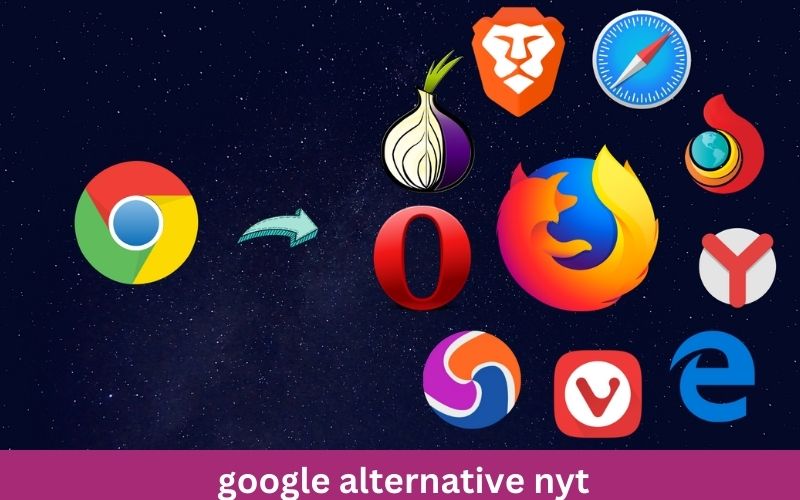In today’s digital age, search engines have become an integral part of our lives. google alternative nyt, with its dominant market share, has long been the go-to choice for most internet users. However, growing concerns about data privacy and user tracking have led many to seek alternatives. In this blog post, we’ll delve into the world of privacy-focused search engines and explore some of the top contenders that offer a viable alternative to Google.
Understanding the Need for Privacy-Focused Search
Google alternative nyt, while a powerful search engine, has faced criticism for its extensive data collection practices. The company tracks user activity, collects personal information, and uses this data to personalize ads and services. While this approach provides targeted advertisements, it comes at the cost of user privacy.
Privacy-focused search engines, on the other hand, prioritize user data protection. They avoid tracking user activity, limit data collection, and often employ encryption to secure user searches. This approach offers a more secure and private online experience.
Top Google Alternative Search Engines
- DuckDuckGo: One of the most well-known alternatives to Google, DuckDuckGo is renowned for its commitment to privacy. It does not track user activity, collects minimal data, and offers a clean and uncluttered interface. DuckDuckGo also provides features like !bang commands, which allow users to search directly on specific websites.
- Brave Search: As part of the Brave browser ecosystem, Brave Search is designed to prioritize user privacy. It uses a decentralized approach to search, relying on a network of independent nodes to provide results. This helps protect user data and ensures that search results are not influenced by commercial interests.
- Startpage: Another popular option, Startpage offers a simple and intuitive interface. It uses Google’s search results but anonymizes user queries to protect privacy. Startpage also provides features like anonymous browsing and a secure email service.
- Ecosia: Ecosia is a unique search engine that donates a portion of its revenue to plant trees. It uses Google’s search technology but prioritizes privacy by anonymizing user searches. By using Ecosia, you can contribute to environmental conservation while enjoying a private search experience.
- Qwant: Qwant is a French search engine that emphasizes privacy and transparency. It does not track user activity, avoids personalization, and provides a clean and ad-free interface. Qwant also offers a range of privacy-focused products, including a messaging app and a web browser.
Key Factors to Consider When Choosing a Google Alternative
When selecting a privacy-focused search engine, consider the following factors:
- Privacy Policy: Review the search engine’s privacy policy to understand how it handles user data. Look for clear statements about data collection, sharing, and retention practices.
- Features and Functionality: Assess whether the search engine offers the features and functionality you need. Consider factors like search results quality, customization options, and additional services.
- Speed and Performance: Evaluate the search engine’s speed and performance. A slow or unresponsive search engine can be frustrating to use.
- Mobile Experience: If you primarily use your smartphone for searching, ensure that the search engine offers a good mobile experience.
- Community and Support: Consider the search engine’s community and support options. A strong community can provide valuable insights and assistance.
Ad-Free or Limited Advertising:
- Privacy Implications: Ads can collect user data and track online behavior. Consider search engines that offer ad-free or limited advertising options.
- Revenue Model: Understand how the search engine generates revenue. Some may rely on donations or alternative monetization methods that prioritize user privacy.
Accessibility:
- User Interface: Ensure the search engine has a user-friendly interface that is easy to navigate.
- Accessibility Features: Look for features that cater to users with disabilities, such as screen reader compatibility and keyboard navigation.
Ethical Considerations:
- Data Retention: Consider the length of time search engines retain user data. Shorter retention periods can reduce the risk of data breaches and misuse.
- Ethical Practices: Research the search engine’s ethical practices and commitment to responsible AI. Look for companies that prioritize transparency and avoid harmful algorithms.
Community and Support:
- Active Community: A strong and active community can provide valuable insights, support, and feedback.
- Customer Support: Consider the availability and quality of customer support. A responsive support team can help address any issues or questions you may have.
Future-Proofing:
- Innovation: Look for search engines that are actively innovating and exploring new technologies to enhance user privacy and experience.
- Long-Term Viability: Consider the search engine’s long-term viability and its ability to adapt to changing technological landscapes.
Conclusion
While google alternative nyt remains the dominant search engine, there are many viable alternatives that prioritize user privacy. By exploring options like DuckDuckGo, Brave Search, Startpage, Ecosia, and Qwant, you can find a search engine that aligns with your privacy values and offers a more secure online experience.
Remember, choosing a privacy-focused search engine is not just about protecting your personal information. It’s also about supporting a more ethical and sustainable internet ecosystem. So, take the time to research your options and make an informed decision.




